If another assembly election were held this year, a likely outcome would be Sinn Féin and the DUP remaining in first and second place respectively but with both gaining seats.
The SDLP could be almost wiped out, the UUP and TUV consigned to irrelevance and the Alliance surge stopped or reversed.
As this is an outcome benefiting Sinn Féin and the DUP, they might see common cause in bringing it about. The DUP could boycott Stormont beyond the end of the caretaker period on October 28, then either or both parties could demand the secretary of state call an election within three months, as required by a law agreed in New Decade, New Approach.
However, this is the only scenario where an imminent election appears possible and it is difficult to see how the DUP would relish the prospect. If there had been a protocol deal by that point, unionist voters would ask why they were being dragged to the polls before Christmas and during an energy crisis when the DUP had got what it claimed to want in order to restore devolution.
If there had not been a protocol deal, the DUP’s campaign slogan would effectively be: ‘our strategy has failed, vote for it again’. This would force the party back to its previous message of delivering a unionist first minister, yet unionists know this backfired in May’s election, motivating nationalists to ensure a Sinn Féin first minister.
The only viable option for the DUP remains the original plan: take whatever protocol deal emerges, spin it as a win and go straight back to Stormont. There is urgency and optimism in London and Brussels, so a deal by the end of October is feasible. Should time run out, a way would be found to stretch the caretaker period or pause the collapse clock. Reports of the Electoral Office and the Northern Ireland Office planning a December election are misleading: officials are only going through the motions and can hardly announce a deadline extension in advance.
The real problem for the DUP is that it has become a sidelined spectator in a process designed to help it. When Liz Truss, as foreign secretary, announced the bill to disapply the protocol in May it was made plain the DUP should restore Stormont quickly in return. The press was briefed to expect a phased restoration of the assembly and the executive as the bill passed through the Commons in June and July.
There was great exasperation in Downing Street when the DUP failed to oblige. Now Truss is prime minister, the bill strategy continues but frustration with the DUP must have deepened. At least when Boris Johnson was in charge, he could console himself the DUP had only made a fool of Liz Truss.
The DUP’s initial caution was understandable as Johnson’s premiership was wobbling and Rishi Sunak, the favourite to succeed him, had reportedly opposed the bill.
But the DUP has spurned its second chance to build goodwill with Truss, which it could have done by nominating an assembly speaker this month. The party showed no intention of doing so even before the Queen’s death interrupted politics. Sir Jeffrey Donaldson has been digging himself further into the trench by insisting the bill becomes law, although this is impossible before October and could be delayed by the Lords until next July.
Truss offered the DUP a priceless appearance of ownership over the protocol negotiations about to take place with Brussels. The outcome could have been presented as a result of unionist pressure on a receptive British government, making it easier to sell unionist voters a protocol deal that must still inevitably make an uncomfortable distinction between Northern Ireland and Britain.
It feels like an insight into Truss’s premiership that as the DUP has bottled it she is pressing swiftly on, with or without Sir Jeffrey’s cooperation. In the DUP’s absence, Sinn Féin is preparing to claim ownership of the process. There has been a noticeable thaw in republican rhetoric towards Downing Street and the Northern Ireland Office, with an emphasis on shared interest in a protocol deal and the restoration of Stormont. Everyone accepts the protocol needs serious improvement, so there should be no difficulty selling even major EU concessions to nationalist voters.
Sinn Féin does not have to pretend it applied any pressure to achieve such a deal. It merely has to be there, ready to get back to work when it happens. History is made by those who show up.









